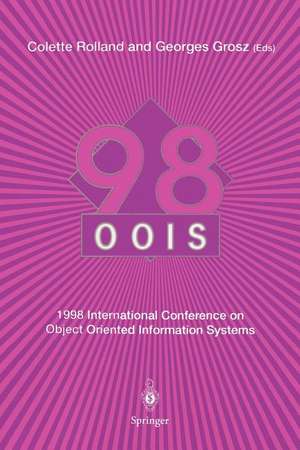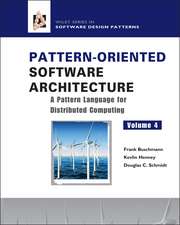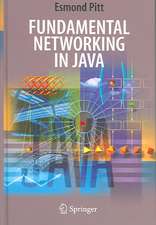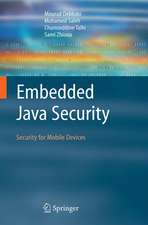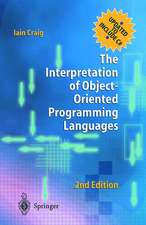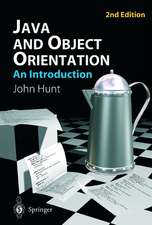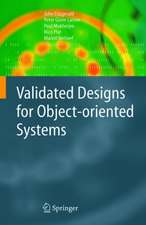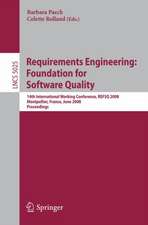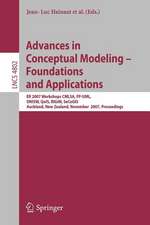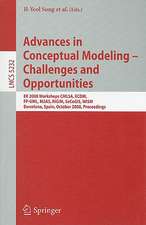OOIS’98: 1998 International Conference on Object-Oriented Information Systems, 9–11 September 1998, Paris Proceedings
Editat de Colette Rolland, Georges Groszen Limba Engleză Paperback – 15 sep 1998
Preț: 343.29 lei
Preț vechi: 429.11 lei
-20% Nou
Puncte Express: 515
Preț estimativ în valută:
65.69€ • 68.90$ • 54.68£
65.69€ • 68.90$ • 54.68£
Carte tipărită la comandă
Livrare economică 01-15 aprilie
Preluare comenzi: 021 569.72.76
Specificații
ISBN-13: 9781852330460
ISBN-10: 1852330465
Pagini: 516
Ilustrații: XVI, 497 p. 82 illus.
Dimensiuni: 155 x 235 x 26 mm
Greutate: 0.72 kg
Ediția:Softcover reprint of the original 1st ed. 1998
Editura: SPRINGER LONDON
Colecția Springer
Locul publicării:London, United Kingdom
ISBN-10: 1852330465
Pagini: 516
Ilustrații: XVI, 497 p. 82 illus.
Dimensiuni: 155 x 235 x 26 mm
Greutate: 0.72 kg
Ediția:Softcover reprint of the original 1st ed. 1998
Editura: SPRINGER LONDON
Colecția Springer
Locul publicării:London, United Kingdom
Public țintă
ResearchDescriere
The Sorbonne University is very proud to host this year the oms Conference on Object Oriented Information Systems. There is a growing awareness of the importance of object oriented techniques, methods and tools to support information systems engineering. The term information systems implies that the computer based systems are designed to provide adequate and timely information to human users in organizations. The term engineering implies the application of a rigorous set of problem solving approaches analogous to those found in traditional engineering disciplines. The intent of this conference is to present a selected number of those approaches which favor an object oriented view of systems engineering. oms '98 is the fifth edition of a series of conferences. Starting in 1994 in London, this series evolved from a British audience to a truly European one. The goal is to build a world wide acknowledged forum dedicated to object oriented information systems engineering. This conference is organized with the aim to bring together researchers and practitioners in Information Systems, Databases and Software Engineering who have interests in object oriented information systems. The objective is to advance understanding about how the object technology can empower information systems in organizations, on techniques for designing effective and efficient information systems and methods and development tools for information systems engineering. The conference aims also at discussing the lessons learned from large scale projects using objects. The call for oms was given international audience.
Cuprins
Invited Talks: Object Databases: Connectivity with Relational Systems and ODMG Standard Standardisation for OO A&D?- Modelling Issues 1: A characterisation of Aggregation. Object-Orientated Hierarchies and their Resulting Complex Systems. Multiple Viewpoints of IS-A Inheritance Hierarchies through Normalisation and Denormalisation Mechanisms.- Queries and Views: Deductive Queries in ODMG Databases: the DOQL Approach. Incremental Maintenance of Materialised Path Query Views. A Multidatabase Layer for the ODMG Object Model Reuse. The Re-Use of Multimedia Objects by Software Agents in the Kimsac System. Design Patterns as Litmus paper to Test the Strength of Object-Orientated Methods. Reuse by Appropriation of Software Elements in Information Systems. Improving Productivity in Building Data-Orientated Information Systems - Why Object Frameworks are not Enough.- Method Issues 1: 'The Truth Is Out There?': A Survey of Business Objects. Patterns for Extending an OO Model with Temporal Features. Design Issues 1. Representation of Multi-Level Composite Objects in Relational Databases. Complex Methods of Class Allocation in Distributed OODBSs.- Modelling Issues 2: Specialisation of Object Lifecycles. An Enhanced Definition of Composition and its use for Abstraction. How to Introduce Emergence in Object Evolution. Evolution and Interoperability. Defining Rules for Schema Transformation. Ontology of Object-Orientated Database Evolution. Capacity-Augmenting Schema Changes on Object-Orientated Databases: Towards Increased Interoperability.- Method Issues 2: Model Engineering Using Charts of Concepts: Application to the Model of the UML. A CASE Tool for the Modelling of Methods and Information Systems. A Semi-Automatic Process for Identifying Overlaps and Inconsistencies between Requirement Specifications.- Design Issues 2: Consistency Analysis Lifecycle Model and Interaction Model. Subjective Method Interpretation of Object-Orientated Modelling. Composition of UML Design Models: A Tool to Support the Resolution of Conflicts. Panel: OO Trends and Perspectives. An Object-Orientated Architecture Model for International Information Systems? An Exploratory Study. A Perspective on Foundations of Object-Orientated Information Systems.
